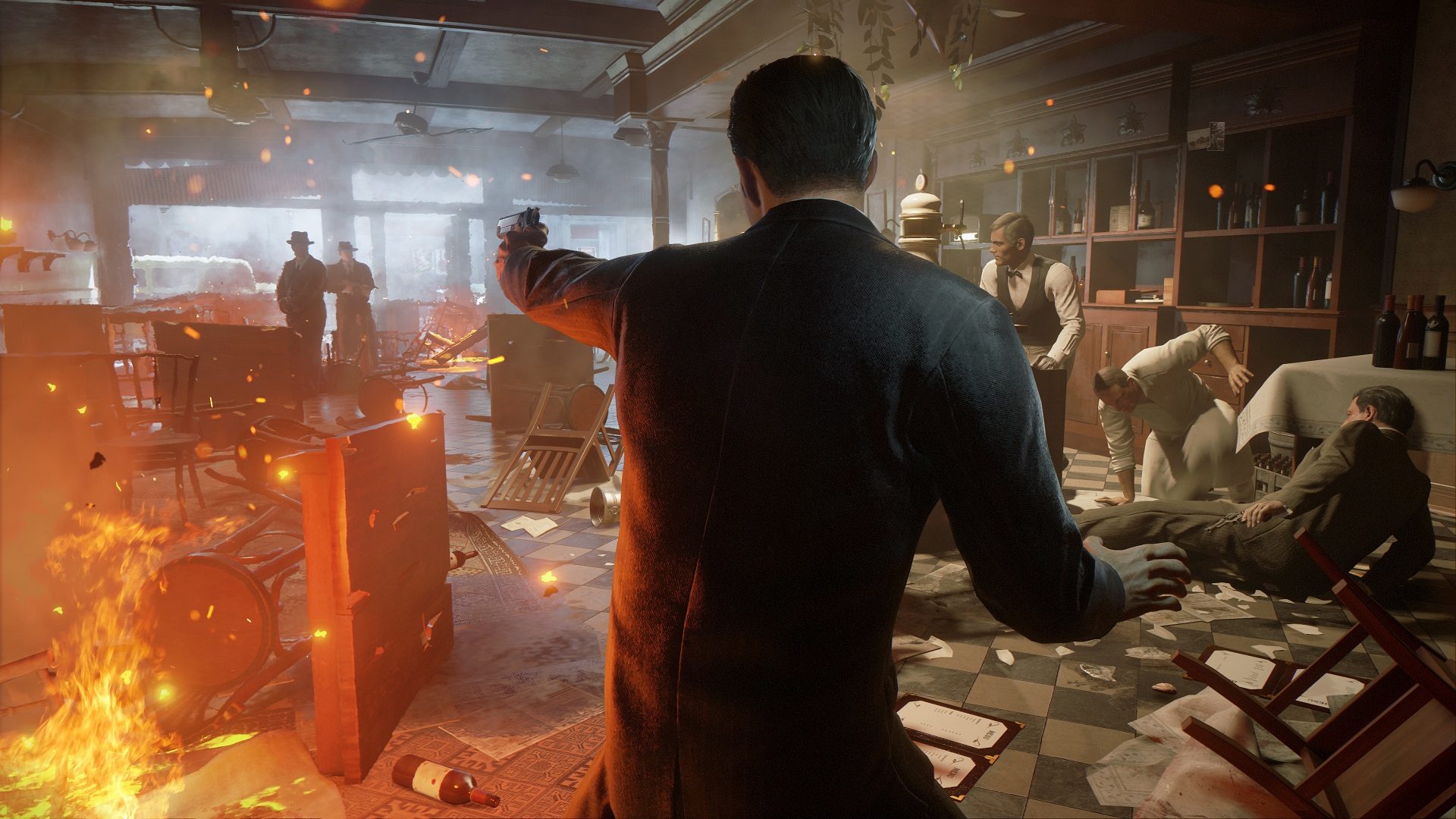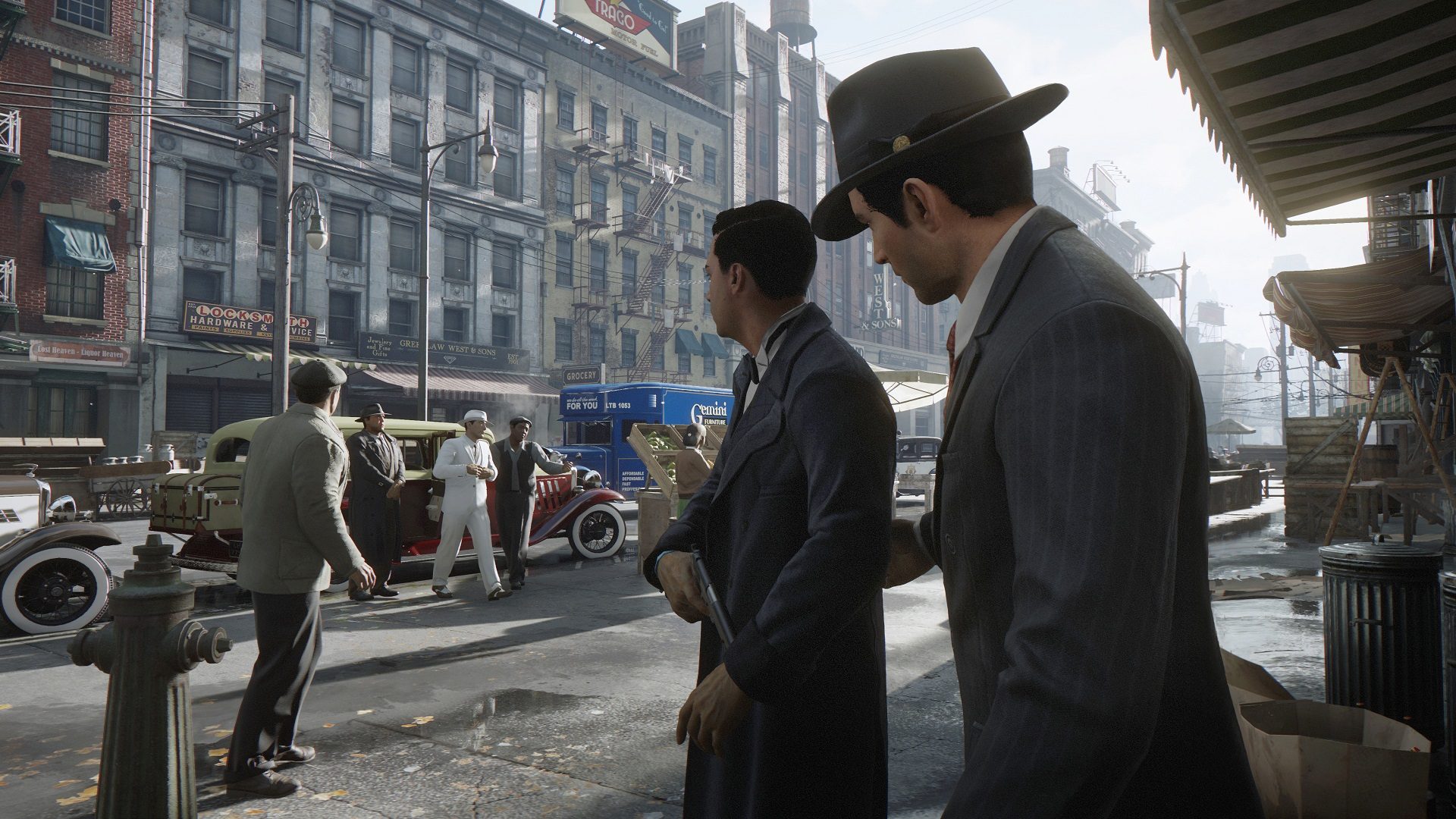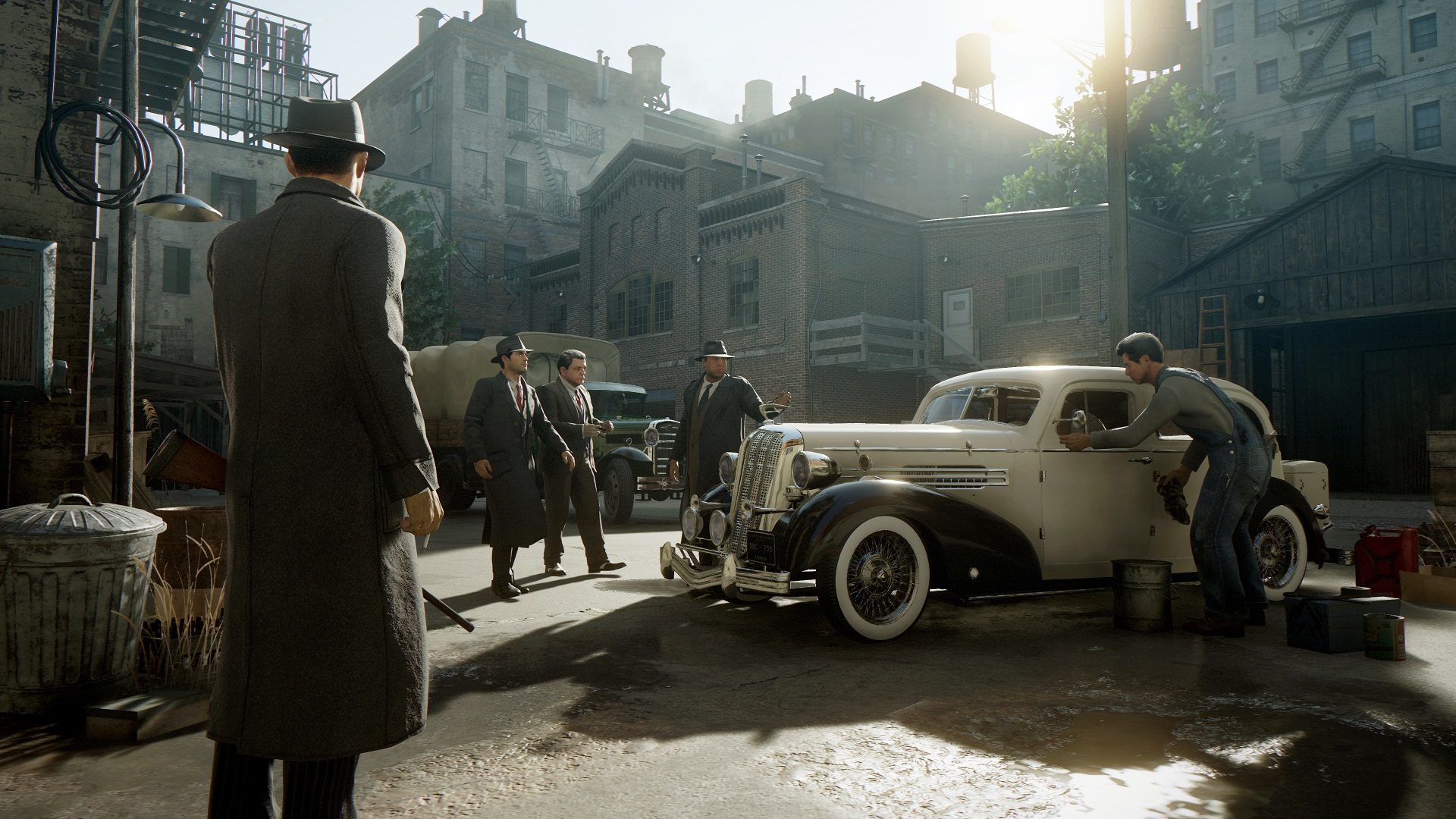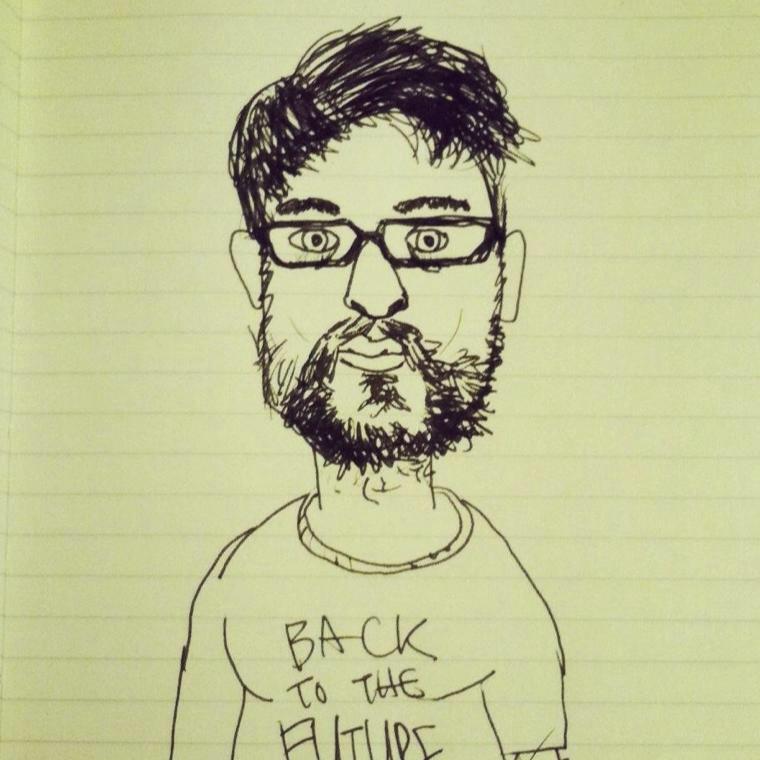Mafia: Definitive Edition feels like a relic, and I mean that as a compliment. In an era when publishing is moving further away from physical releases and the history of video games is facing an extinction event (and a pandemic closing the few museums we have isn’t helping), a remaster that actively preserves design elements of the early forays into 3D open-world action gaming is a precious document. Viewing it through that lens, one could consider Mafia: Definitive Edition nigh indispensable.
What’s most noticeable about Mafia: Definitive Edition is what’s missing: a rash of map icons, a never-ending checklist of filler objectives, the dreaded “promise” of live-service updates, or any of the other illusory “content” that modern games use to trap their players in their Sisyphean grinds. In fact, by preserving the original Mafia’s structure so faithfully, Hangar 13 has laid bare the inconvenient truth about modern gaming, which is that all the gacha mechanics, staggered update drips, and season passes have led to a period of creative stagnation—at least when it comes to the major publishers.
That’s all to say that Mafia: Definitive Edition is a refreshingly straightforward experience, one that wants to immerse players in an approximation of an historical period, tell a story, and entertain with a variety of action setpieces.

One of the ways that Hangar 13 streamlines the experience of open-world gaming is how it utilizes its setting. Taking place throughout the 1930s, Mafia: Definitive Edition is set in a revitalized version of the original’s Lost Heaven. Looking beyond the fact that “Lost Heaven” is the most ridiculous name for what’s ostensibly supposed to be a major U.S. city, the setting itself is just that: a setting. It isn’t a playground, and it isn’t even an obligation, in the sense that you don’t need to explore it or even interact with it if you don’t want to. Heck, you can even skip non-essential driving so you can get right to the action. It’s a backdrop, and it’s context for the story that Mafia is telling, and in that way it functions beautifully.
Lost Heaven is the first aspect where Hangar 13’s efforts to rebuild Mafia really sing. Maybe it’s due in part to the fact that I live in a city I love that I can’t currently enjoy, but simply taking in the sights of Lost Heaven, unencumbered with any obligation to check every alley or side street, is a joy. As someone who truly believes in video games’ unique power to transport players to historical settings (and as someone who is also routinely disappointed with how developers treat these historical settings), Lost Heaven is a satisfying interpretation of Prohibition-era Chicago. It’s a little light on the details, and its inhabitants might not have the kind of rich diversity of personalities you’d find in something like Red Dead Redemption 2. But when it comes to the broad strokes, Lost Heaven is as pretty as a postcard and provides plenty of interesting settings for Mafia’s most intense moments, whether that’s having a shootout with police in an abandoned prison, outrunning a tank in the countryside, or chasing a crashing plane through the city.
The other area where Hangar 13’s restoration efforts pay off is in its animation, cinematography, and performances. Mafia: Definitive Edition feels like a modern experience in many ways when it comes to how it’s telling its story, and that’s largely due to the amount of effort that went into recasting and rerecording Tommy, Paulie, Sam, Sarah, and Don Salieri. While Tommy DeAngelo’s new voice might be a little too gravely and “tough guy,” it’s still marked improvement over the phoned-in original. It’s hard not to feel like this is somewhat due to the collective work of everyone in the video game industry to establish the medium as one that should be taken seriously, not least of all by its actors. But Hangar 13 should be individually celebrated here, too, for breathing new life into what were dated and stiff characters. Even small, throwaway lines feel more natural and more modern, both in the writing and the performing.

The gameplay itself is definitely an improvement over the original, as it’s basically the same as it is in Mafia III. Whether that’s a good thing or not depends on whether you liked navigating and shooting your way through New Bourdeaux. If you haven’t played that game, Mafia: Definitive Edition is basically a jack of all trades, master of none when it comes to gameplay mechanics.
The shooting feels punchy and satisfying, but aiming can take some getting used to, at least if you’re playing on a controller. That’s fine, as it adds to the sort of wild feeling of a Hollywood shootout. Unfortunately, even as you’re missing (a lot, sometimes), the enemies in Mafia: Definitive Edition don’t miss. Like, at all. Every gangster in Lost Heaven is a deadeye shot. This means that you’ll want to use the game’s cover system to protect yourself, which is not as refined as Gears of War, but it’s still a little more fleshed out than, say, a Rockstar game. Tommy, though he’s about six inches shorter and 100 pounds lighter than Lincoln Clay, feels about as heavy to move as Mafia III’s protagonist. Again, you get used to it, but Hangar 13 definitely could have used this as an opportunity to tweak and refine. Alas, it feels more like the developers copied and pasted.
Driving will also be a matter of opinion. Personally, I loved how it felt to be behind the wheel. The cars handle the way you’d expect cars from the 1930s to handle—the turning radius is crap and it takes about an hour to brake, especially if you’re going over the speed limit. What results is a more considered and thoughtful driving experience, especially paying off when you’re forced to push the pedal to the metal in a car that feels like a barrel going over a waterfall.
One place where Mafia: Definitive Edition definitely shows the age of the original game, however, is in its story. On a performance level, Mafia: Definitive Edition is fully modernized and improves on its predecessor in every way. But when it comes to the broad strokes of the story and the characters themselves, Mafia doesn’t really hold up. The main issue, besides the pacing of the story, is Tommy himself. Back in 2002, believing that a cab driver could so quickly become a mass-murdering mob enforcer wasn’t such a hard pill to swallow, because game stories as a whole (with obvious exceptions) were just excuses to get to the next moment of action. But in an era where deep and satisfying character development is kind of the norm, Tommy’s rise and subsequent fall feels like it could be happening to anyone. Tommy’s decisions that lead to the story’s ending feel like they happen because they’re expected to happen for this kind of story, not because of Tommy himself. The series has obviously evolved to create more interesting protagonists with Vito and Lincoln, but any real lack of development or interesting story beats in the 2002 Mafia stick out more because of how much every other aspect of the game is improved in the remake.
When the original Mafia launched in 2002, it was following Grand Theft Auto III and would soon be followed by Vice City. By comparison, at least to my underdeveloped teenage brain, it seemed like a mere mimic of Rockstar’s mind-blowing, game-changing series. Twenty years later, in an era of map icons and checklists, Mafia’s streamlined attitude towards open-world design is refreshing, even eye-opening. More modern games need to take a page out of Mafia: Definitive Edition’s attitude towards design and structure. Maybe ignoring the past isn’t the best way to move forward.

|
★★★★☆
Mafia: Definitive Edition is the best of both worlds. Its updated graphics bring Lost Heaven and its inhabitants to life without burdening them with modern game design elements. While the characters themselves haven’t aged as well, Mafia: Definitive Edition, though based on a game that’s nearly 20 years old, feels more refreshing than most open-world games. |
Developer Hangar 13 Publisher 2K Games ESRB M - Mature Release Date 09.25.20 |
| Mafia: Definitive Edition is available on Xbox One, PS4, and PC. Primary version played was for Xbox One. Product was provided by 2K Games for the benefit of this coverage. EGM reviews on a scale of one to five stars. | |

Michael Goroff has written and edited for EGM since 2017. You can follow him on Twitter @gogogoroff.